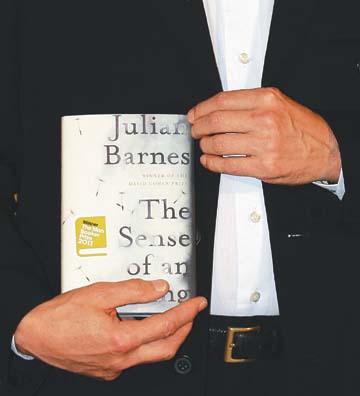|

ENGLISH author and bookmakers’ favorite Julian Barnes finally won the Man Booker Prize for fiction Tuesday, despite once dismissing the coveted award as “posh bingo.”
The 65-year-old triumphed with “The Sense of an Ending,” which at 150 pages was described by one review as a “novella.”
It was his fourth time on the Booker shortlist — Barnes was previously nominated for “Flaubert’s Parrot” in 1984, “England, England” in 1998 and “Arthur and George” in 2005.
Stella Rimington, a former British spy chief who chaired the panel of judges this year, told reporters, “We thought that it was a book which, though short, was incredibly concentrated, and crammed into this very short space a great deal of information you don’t get out of a first reading.
“It’s one of these books, a very readable book, if I may use that word, but readable not only once but twice and even three times.”
Ion Trewin, administrator of the prize, said it was not the shortest work to win the Booker. That honor goes to Penelope Fitzgerald’s “Offshore” which came in at 132 pages in 1979.
Barnes, who has been critical of the prize in the past, said he was relieved to have won at the fourth attempt.
Barnes received a check for 50,000 pounds (US$80,000), a flurry of media attention and, perhaps most importantly, a major boost in sales.
“Writers it tends to drive mad with hope and lust and greed and expectation,” he told reporters after receiving the award.
“I was saying that the best way to stay sane is to treat it as if it’s posh bingo. That is ... until you win it, when you realize that the judges are the wisest heads in literary Christendom.”
Rimington and her judges came under fire in recent weeks for stressing the importance of “readability” when judging the winner, a term interpreted by some as dumbing down one of English-language fiction’s top accolades.
Writers from the Commonwealth, Ireland and Zimbabwe are eligible.
The sniping in the narrow world of British “literati” even led to a rival award being set up to champion what its backers said was a more high-brow approach to writing.
Rimington defended her stance, arguing that entertainment and literary criticism were not mutually exclusive.
“We were not talking about only readability as some of you seem to have thought,” she told reporters.
“We were talking about readability and quality. You can have more than one adjective when you are talking about books.”
“The Sense of an Ending,” published by Random House, tells the story of Tony, a seemingly ordinary man who discovers that his memories are not as reliable as he thought.
This year Barnes was up against Carol Birch for “Jamrach’s Menagerie,” Canadian authors Patrick deWitt and Esi Edugyan for “The Sisters Brothers” and “Half Blood Blues” respectively, and debut British novelists Stephen Kelman (“Pigeon English”) and A.D. Miller (“Snowdrops”).(SD-Agencies)
|

